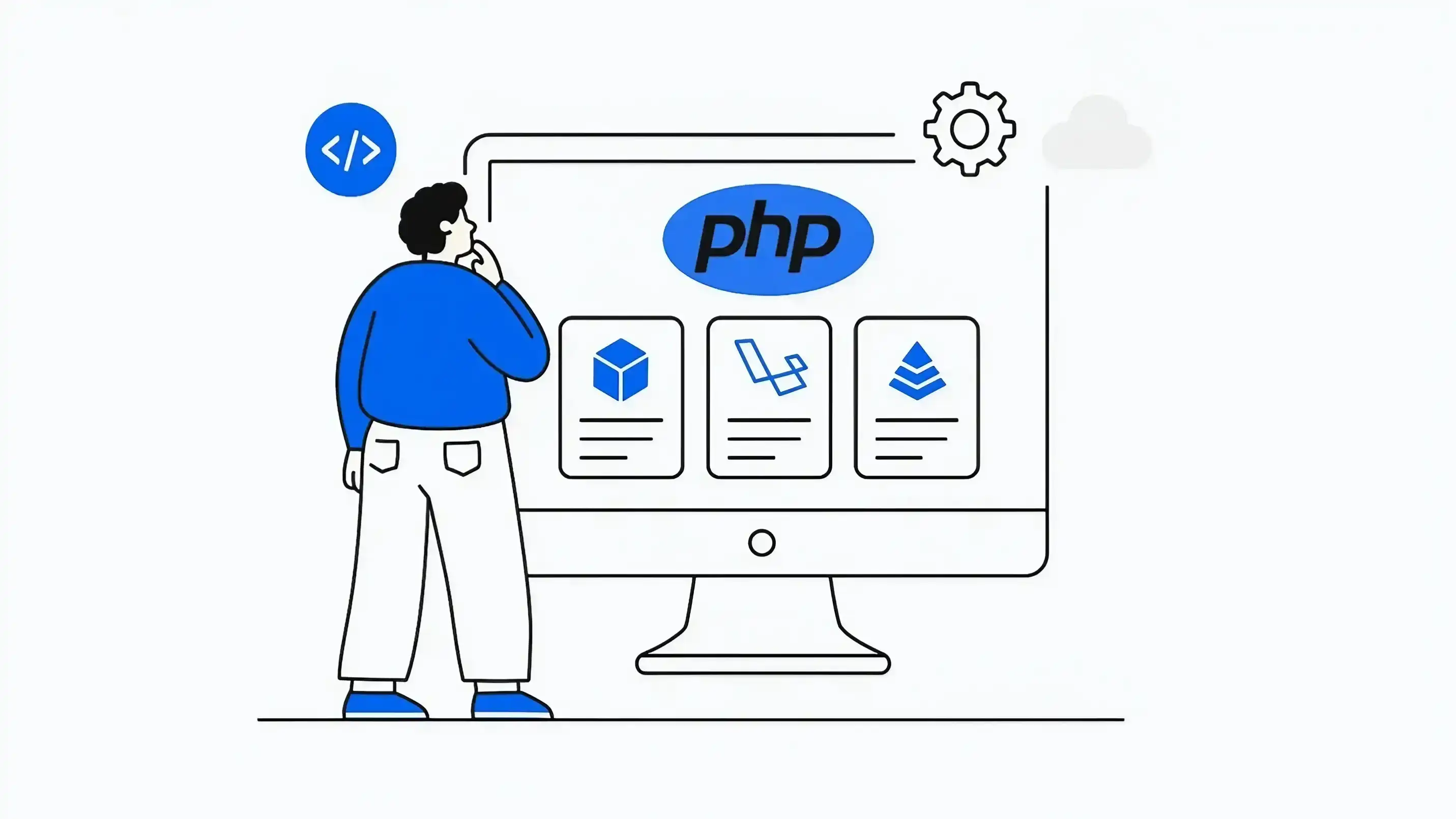If you plan to develop a website in 2025, you need to pay special attention to the best PHP frameworks that fit your business needs and save you both time and money.
Creating a website or mobile app from scratch involves a lot of hard work and, by doing so, you will recreate functions that have already been invented earlier and are available for free. So why not use them and put your focus on developing business-related features for your digital products?
A PHP web development framework is a foundation for developing your web application without reinventing the wheel. But, choosing the right PHP framework for web development requires a little hard work. You will have to analyze the pros and cons of all the available frameworks to match the right one with your business needs.
Sounds difficult? Don’t worry.
This blog will help you find the best PHP frameworks for website development by introducing you to the top eight options. But, let’s get started by grasping the basic benefits of using a PHP framework.
Why Use a PHP Framework for Web Development?
When you think of developing a web application, choosing a robust tech stack should be your priority. PHP, being one of the world’s most popular server-side scripting languages, is a viable option for so many reasons – ease-of-use, flexibility, scalability, and more.
Owing to the advantages it offers, more than 80% of web apps are developed using PHP. The diagram below by W3Techs shows PHP’s market position in terms of traffic and popularity compared to other popular programming languages.
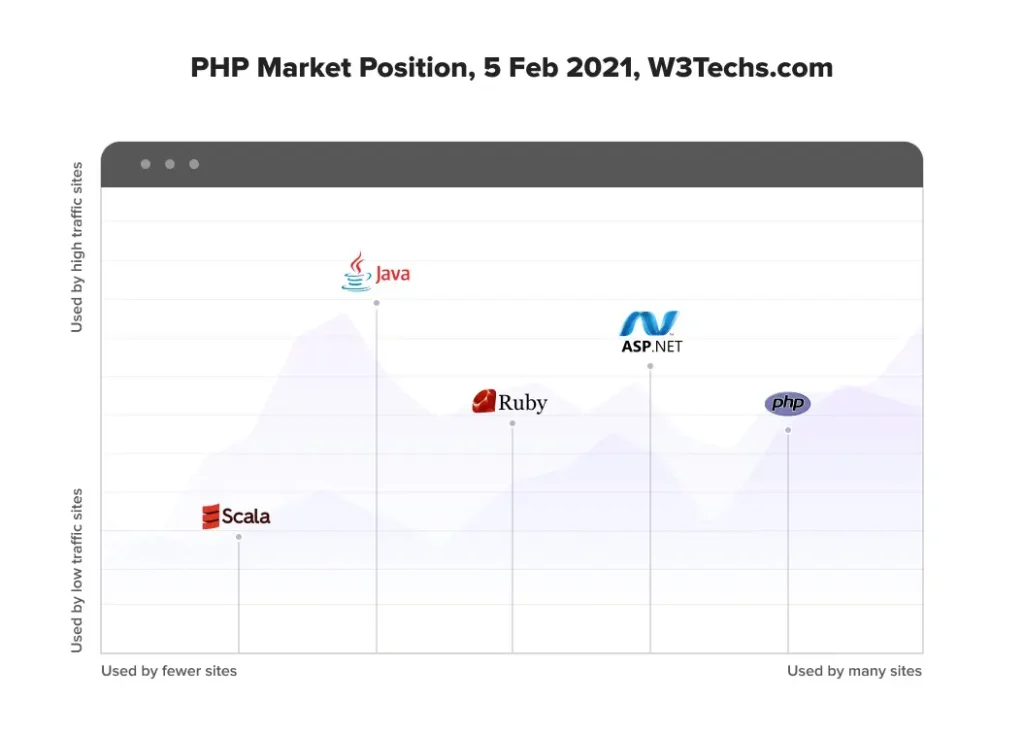
Now, if you are thinking about PHP’s capabilities in terms of handling traffic. According to sources, it is used by some of the large platforms and websites that exist over the internet, including Facebook and Wikipedia, that have monthly traffic in the billions.
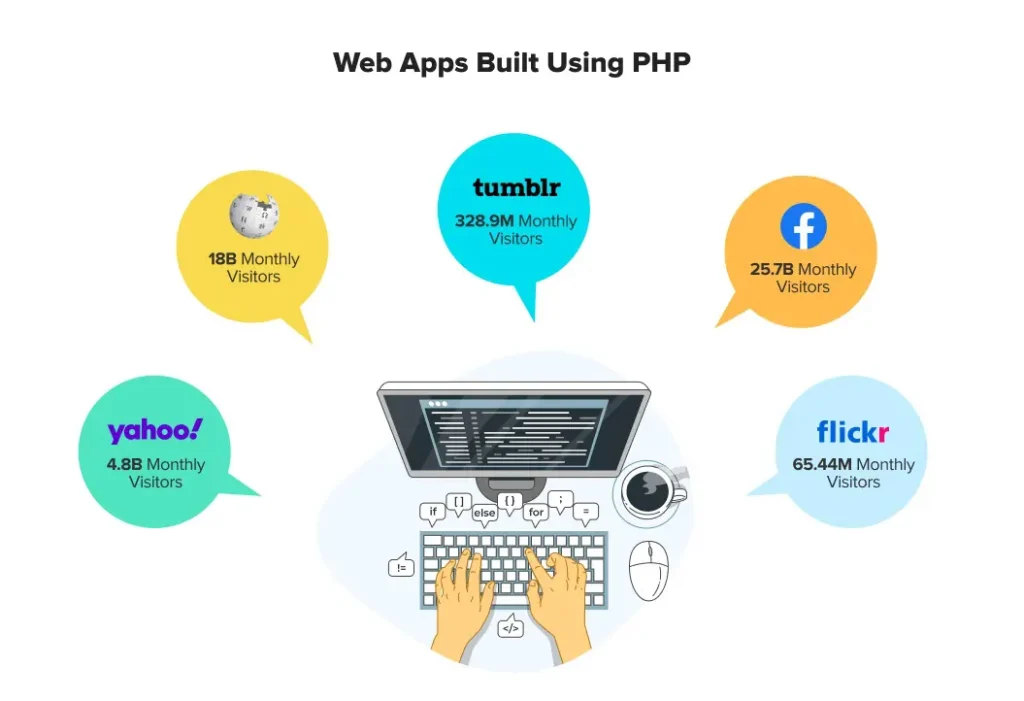
But, many times, coding in PHP can get repetitive and complex, just like in any other programming language. That’s where the PHP frameworks come into play. These frameworks streamline the PHP development process by making web development faster and more efficient.
Faster Time to Market
In today’s modern startup ecosystem of getting the MVP out in the Market ASAP, your web development speed is something that can affect your business. You can win this situation using an efficient PHP framework that addresses all of your business needs and gets your work done in the shortest time possible.
Popular PHP frameworks have the best solutions for common problems, several libraries for common tasks, and provide you with a robust app architecture (generally based on MVC pattern) to up your web development game. As a result, you can spend time developing your web app’s core features, rather than reinventing the wheel by doing coding from scratch.
Top-Notch Security
According to Net Solutions’ digital transformation report, 37.3% of organizations believe that digital security is the biggest challenge they face on the road to digital transformation. As most of the PHP frameworks are open-source, the solutions and functions added to them are continuously tested and validated by several developers using the framework.
Therefore, security threats like SQL injection or cross-site scripting that you might ignore in your code get noticed and solved quickly in the popular PHP frameworks.
But, just using a secure PHP framework doesn’t mean you can avoid all security parameters or development practices when developing a web app. Remember, nothing is a substitute for writing optimized and secure code.
Easy to Use
If you code your web app from scratch, you will surely remember all your functions and classes by heart. But, as you onboard new team members, it will not be as easy for you to manage things.
Without knowing the complete documentation, design decisions, and functions, new developers will find it hard to work on your project. Using a PHP framework with clear documentation, common design patterns, and online tutorials can help them grasp everything smoothly and work collaboratively.

We respect your privacy. Your information is safe.
8 Best PHP Frameworks for Website Development
When choosing a development framework, it is essential to make sure that you select the one that enhances your app’s performance and lessens its time-to-market. Listed below are some of the best PHP frameworks for website development to choose from in 2025:
Laravel
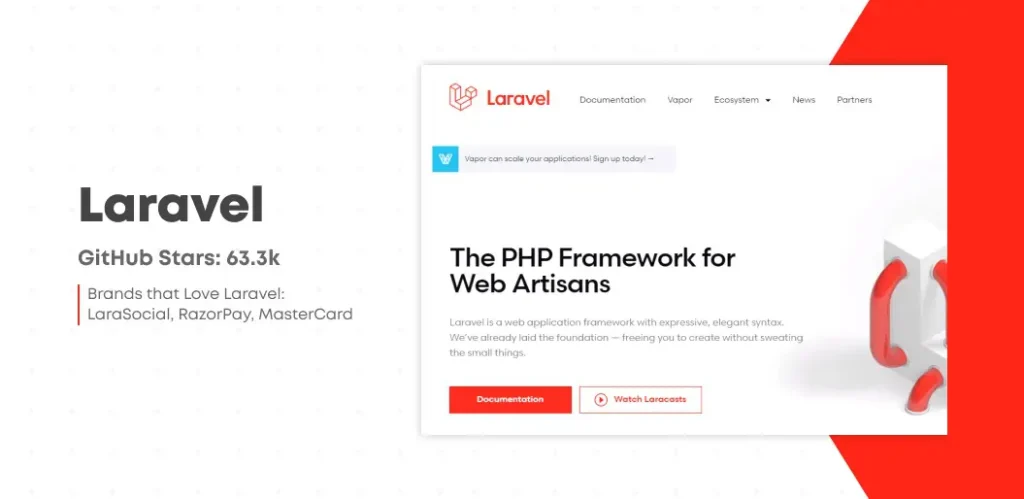
Laravel is one of the best MVC-based PHP web frameworks that is open-source, easy-to-use, intuitive, and scalable. To build advanced, multifunctional, B2B, or enterprise-level web apps, Laravel is a preferred choice due to its ability to handle complexity with speed and unmatched security.
Most developers love Laravel framework as it simplifies development by easing some common tasks like routing, authentication, and queuing. It also has more than 20 built-in libraries that make working on projects easier without reinventing the wheel, such as an authentication library to improve security.
The framework also automates tasks such as generating PDF invoices, processing coupons and managing subscription numbers. All in all, everything that could have been done manually can be automated using Laravel. It also positively impacts a project’s overall budgeting as high developer productivity speeds up the development process.
Key Features of Laravel
- Improved performance and more detailed documentation than any other PHP environment
- Provides caching support, which results in high-performing backends, speedy task execution, and advanced memory management
- Supports easy and automated testing, which shortens the time-to-market
- Provides a simplified email integration system
Disadvantages of Laravel
If you plan to add and manage a lot of content (the news website, blog, or online store) in your web application, Laravel PHP framework is not the best option. With it, you will have to create a separate admin panel to manage and edit things accordingly. If you think that several stakeholders will need access to the settings or backend of a web app you have created, try using a CMS instead of Laravel.
Symfony
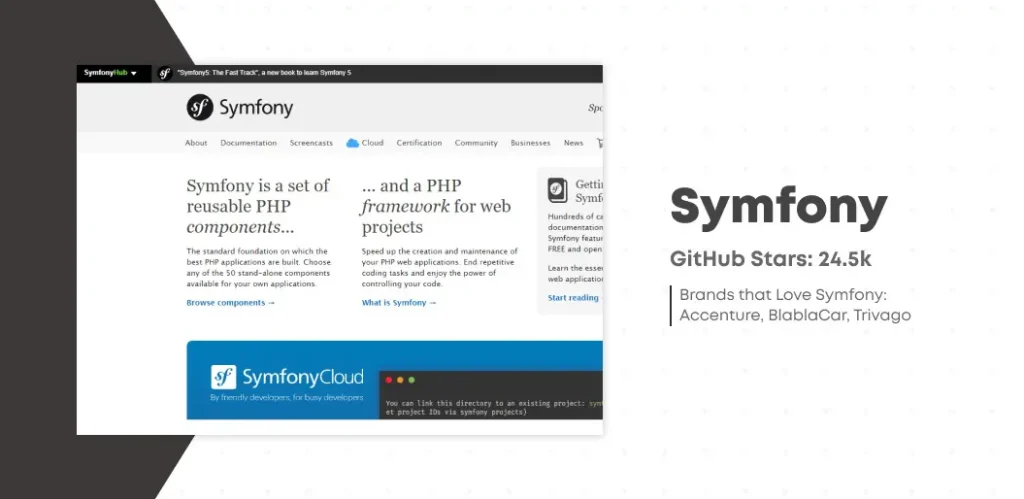
Released in 2005, Symfony is considered one of the most reliable, and best PHP frameworks for website development. It is packed with many features that make creating an enterprise-level web application easier and seamless.
The Symfony framework’s significant advantage is that it provides bundles and components for higher flexibility and developer productivity. While bundles are almost the same as plugins, components are generic features that can be used to reduce a developer’s regular work while creating web apps. It provides developers more bandwidth to work on business-specific features and functionalities.
The great thing is that these components can also be used in other frameworks or PHP solutions to achieve maximum productivity. Thus, Symfony Framework should be your preferred PHP framework if you want to create a highly flexible and feature-rich application.
Key Features of Symfony
- A stable and well-tested framework with amazing community support and regular updates
- Reduces redundant coding with dependency injection, which makes classes co-dependent
- Easy app maintainability due to reusing of components and the absence of dependencies
- A well-structured documentation, fast code changing, and automated data migration
- PHPUnit makes unit testing faster, and you can also automate functional testing to reduce the developer’s work
Disadvantages of Symfony
You simply cannot trust Symfony with app performance and speed. This is the reason it is not preferred to create high load real-time apps with Symfony. This is especially true for apps in which users interact with each other in real-time (eg. social media apps). The framework also has a steep learning curve and you may have a hard time finding expert Symfony developers.
CodeIgniter
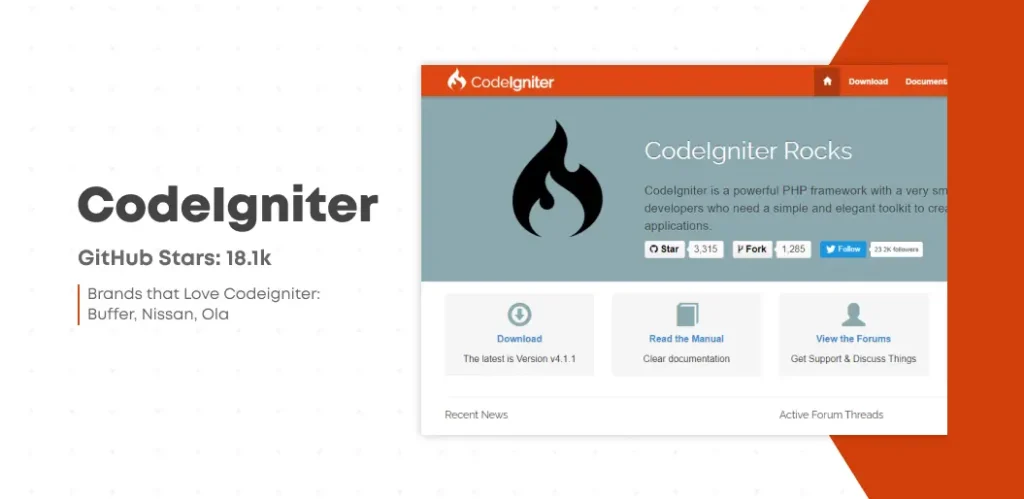
Known for its small size (just 2 MB, including the documentation), CodeIgniter is an MVC-based, fast, reliable, and quite widely used PHP framework for rapidly creating dynamic web apps. The framework has many built-in modules that let you create strong and reusable components for making the entire development process seamless and fast.
CodeIgniter also has the reputation for being the fastest PHP framework for web development. If a web app revolves around data management, CodeIgniter is the best PHP framework as well. Using CodeIgniter, it is easy to create, insert, update, and delete coding statements without writing raw SQL.
Due to its reliable performance and faster speed, Codeigniter framework is the best PHP web framework when developing light-weight applications that run on simple servers.
Key Features of CodeIgniter
- Easy error handling and leaner server requirements
- Allows easy database tweaking and data transfers
- Light-weight framework that helps in creating scalable web apps
- Includes form and data validation functionality
- The framework is extendable (it lets you create your own libraries, APIs, and packages)
Disadvantages of CodeIgniter
CodeIgniter web framework is a lightweight PHP framework for web development that has a number of built-in security features like XSS filtering, CSR protection, password handling, and more. However, the framework updates are a bit irregular. So, it won’t be a good fit for apps that demand high-level security.
Cake PHP
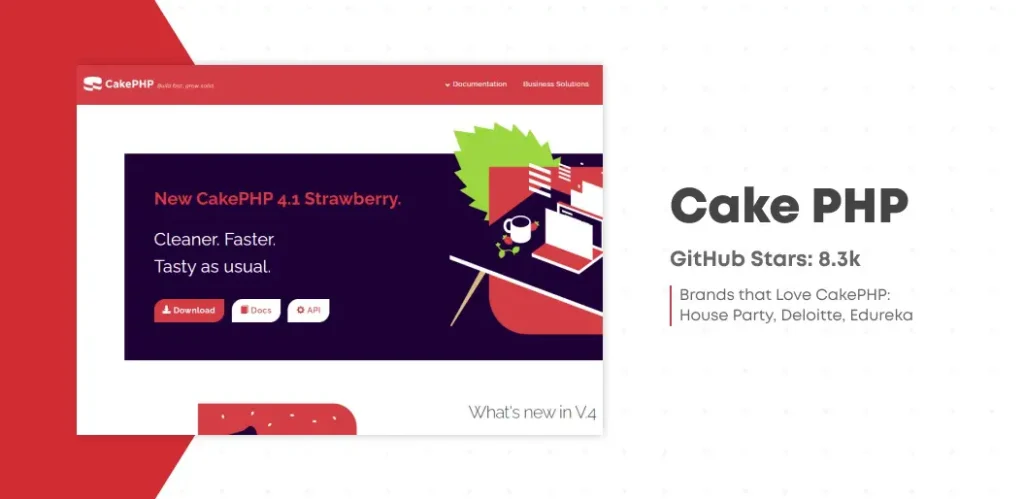
CakePHP is an open-source PHP framework that follows the MVC model and makes web app development faster. It lets developers keep the app interface separate from business logic, making it easy for them to work on various parts of the app simultaneously.
Using CakePHP, one can build visually impressive and feature-rich web apps, as it comes packed with a templating system that lets developers enhance the overall look and feel of an app using custom templates.
The framework also lets developers create standalone libraries, components, extensions, and helpers to reuse code and spend less time doing coding for similar functions, which has a positive impact on web app development cost.
Although the framework is more than a decade old now, it has never lost its essence due to continuous updates rolling out which addresses changing business requirements. It offers amazing performance and has a huge community of developers.
Key Features of CakePHP
- Built-in testing features to maintain and enhance the code quality
- CRUD scaffolding for easily creating, modifying, and updating code
- Secure PHP framework that includes CSRF protection, XSS protection, & SQL injection prevention
- Built-in validation features that make development easier and less time consuming
- Helps in managing the database efficiently with automating features
Disadvantages of CakePHP
Unlike many popular PHP frameworks for website development like Symfony and Laravel, CakePHP doesn’t support default routes for fancy URLs. So, developers must update the default routes for creating fancy URLs that affect the efficiency of CakePHP adversely and sometimes make it unsuitable for modern web application development.
Yii
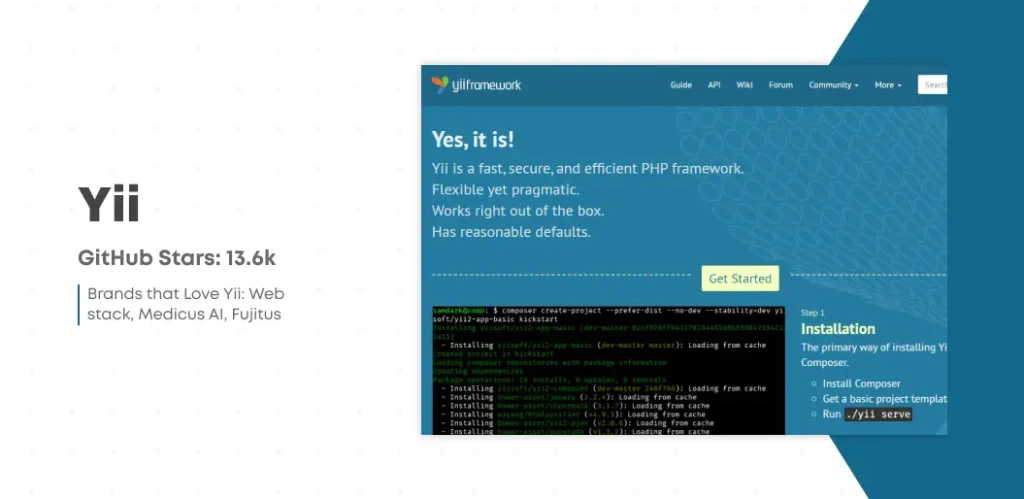
Yii is an open-source, high-performing, component-based PHP framework for creating large-scale web apps. It provides several highly extensible tools for generating code fast with features like form inputs and CRUD.
The framework comes with several security features such as cookie attack prevention and cross-site scripting prevention, making it suitable for developing large projects like eCommerce stores, CMS, forums, and many others. The framework also provides elegant caching support, which lets developers create highly optimized web apps.
Key Features of Yii
- Integration with jQuery and AJAX features
- Offers amazing performance and development speed
- It comes with Gii, which eases the process of rapid prototyping
- Provides efficient logging and error handling systems
- A large community of developers to help with problems and queries
Disadvantages of Yii
While a number of developers out there love the Yii framework, you will also find plenty of others who just can’t stand it because of its over-reliance on static methods. Also, working with Yii needs greater attention as one mistake in code can ruin the entire application.
Phalcon
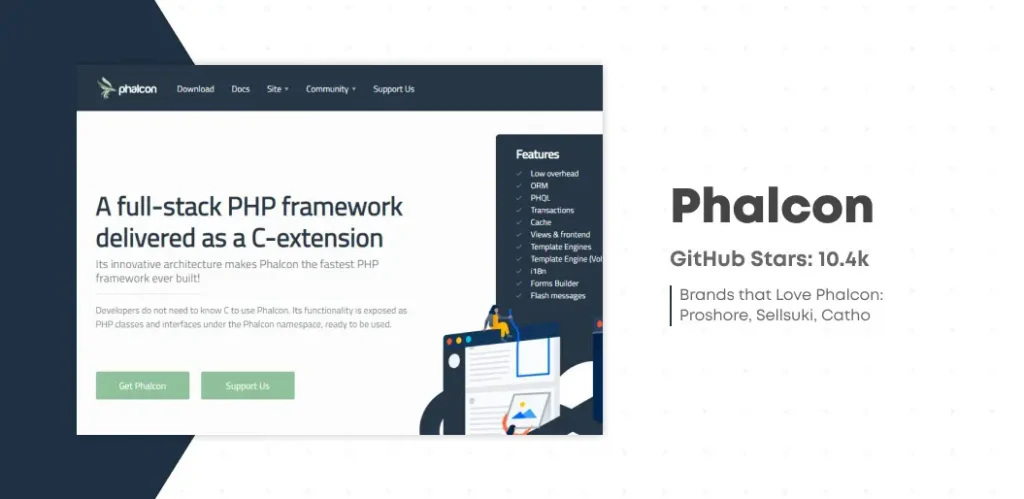
Released in 2012, Phalcon is a full-stack PHP framework for website development. Though the framework is a C-extension, you don’t need to learn C to build PHP web apps with Phalcon.
Based on the MVC pattern, it is the first PHP framework that implements ORM in C-language. It uses a handful of resources and requires fewer code lines to implement a specific task. That’s why it is the preferred choice for creating blazing fast and high performing websites.
Key Features of Phalcon
- Best framework for developing highly configurable web apps
- Uses volt template engine and has a very clear and concise syntax
- Fast compilation and execution speed leading to the good performance of the app
- Efficient asset management, top-notch security, and caching support
Disadvantages of Phalcon
Phalcon PHP web application framework is blazing fast, but it is not perfect for every website. If you have shared hosting, it is impossible to use Phalcon. This framework is only excellent for large and performance-driven websites that don’t have shared hosting.
Zend
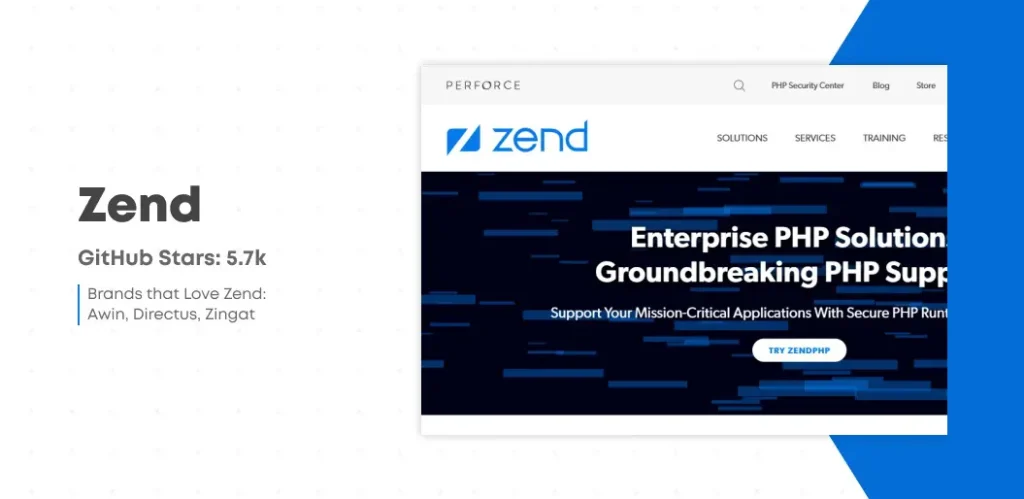
Zend is an open-source and easy to use PHP framework for building feature-rich enterprise-level websites. Since it is an object-oriented framework, it uses concepts like interfaces and inheritance. Most of its components are customizable and extensible, and web developers can create their variation without touching the core code-base.
Code in Zend is more structured and reusable than many popular PHP frameworks, making it a good fit for large-scale, enterprise-level, complex projects. You can also integrate Zend with certain third-party libraries and templates; it never slows down an application, even if it handles a vast database.
It is highly recommended to create a big-data application with Zend framework, being a server-side scripting language with all its features and functionalities.
Key Features of Zend
- Offers amazing performance, speed, security, and extensibility
- Based on Agile methodology and follows PHP best practices
- Has extremely detailed documentation and a large community of developers
- The framework is HTML5 compliant and supports a lot of input data types
Disadvantages of Zend
There is no doubt that Zend is a highly customizable framework. It has many external plugins that can help you attain a specific feature without much coding. However, these plugins come at a high cost. As a matter of fact, Zend plugins are more expensive than plugins in any other PHP framework. So, if you are on a tight budget, Zend may not be a suitable PHP framework for your website development.
Slim
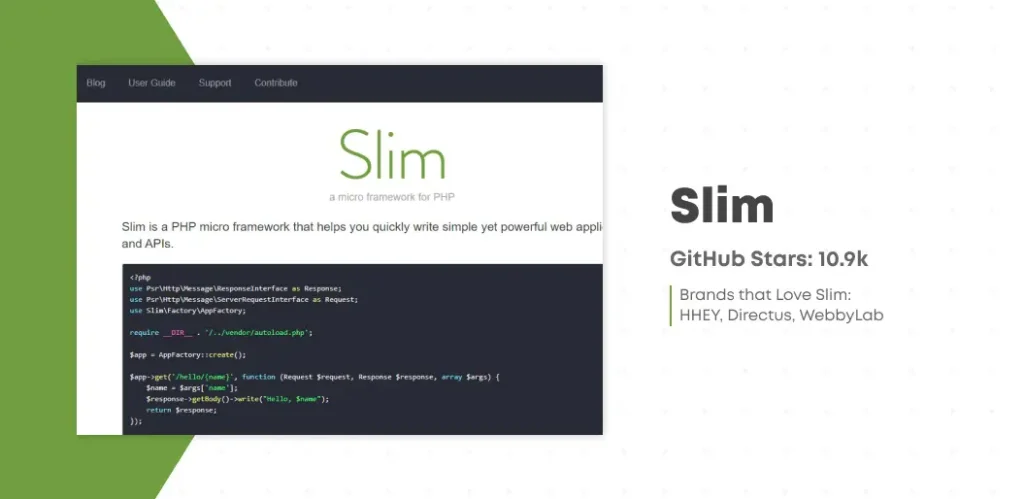
If you are planning to build a simple yet powerful web app, Slim should be your preferred choice. It is a PHP micro-framework with fewer features than other popular PHP frameworks but lets you create robust APIs and web applications.
Packed with features like middleware and routing, Slim allows developers to build apps quickly and with the utmost security. It is also known as the best PHP framework for small scale projects or web apps that don’t require many features. Slim is also used widely to create restful APIs for single-page apps and web services.
Key Features of Slim
- Develop lightweight APIs and requires just a few lines of code
- A fast loading framework that is able to handle many requests per second
- Supports a number of key functionalities like URL routing, cookie encryption, and middleware
Disadvantages of Slim
Slim is the best PHP framework to use for a small website. However, if you plan to build a complex, large-scale website, it isn’t a great choice. Also, dependency injection is quite weak, and it’s hard to use model properties in Slim.
Which PHP Framework is Best for Web Development?
Though there are many PHP web frameworks available in the market, each one has its own pros and cons. Similarly, no business has the same requirements, and every web development company or developer has different preferences. Therefore, it is crucial to analyze every PHP framework depending on the task at hand, website developer’s preferences and expertise to accomplish the given task.
All the frameworks listed-above are efficient, have excellent technical specifications, and are widely used for website development. But, there is never a one-size-fits-all. Therefore, see what your business needs are and then find the one which suits you best.
Now tell us in the comments below which is your favorite PHP framework and which one you will use in 2025.

